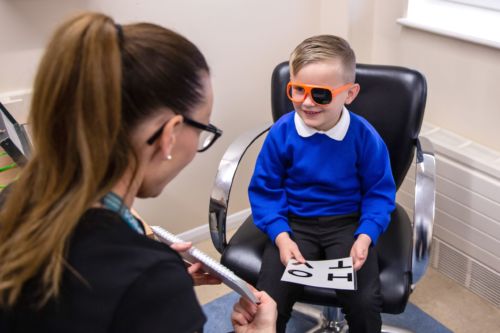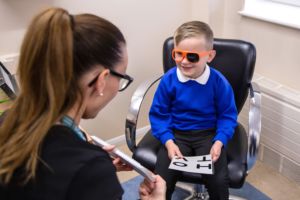Vision Screening
BIOS supports orthoptic led vision screening for 4-5 year olds being made mandatory across the UK and Ireland.
- Screening for visual impairment should be mandatory across the UK and Ireland
- This should be done in a school setting for all 4-5 year olds
- This should be organised and led by Orthoptists
While orthoptic led vision screening is offered to all children in the Republic of Ireland and in Scotland, Wales and Northern Ireland, provision in England is much less consistent.

We are therefore calling for an orthoptic-led national screening programme in England, to ensure all children receive the same care when they need it, regardless of where they live.
Why is screening necessary?
Vision screening allows the detection of reduced vision in one or both eyes at an age when treatment has the potential to improve vision.
The target condition is Amblyopia, where the vision in one or both eyes doesn’t develop properly. It is estimated that 1 in 50 children will develop this condition but often younger children are unaware there is anything wrong with their vision, as they have grown up with and become used to it.
Amblyopia can be treated successfully in younger children but if undetected can result in permanent lifelong reduced vision.
Why Orthoptic-led?
Orthoptists are specialists in testing vision and detecting visual problems. They are therefore ideally qualified to lead on vision screening.
- Amblyopia is most commonly caused by strabismus, where the two eyes are not aligned, or a refractive error leading to a lack of focus within one eye. Orthoptists are the experts in diagnosing and treating such conditions.
- Orthoptists are experts in the assessment of visual defects in young children. They are also uniquely qualified to offer services for children with learning disabilities or with specific needs who require an alternative method of testing.
Vision screening programmes should therefore be organised and led by qualified Orthoptists, with screening in schools carried out by Orthoptists or health care workers trained and managed within an orthoptic-led service.
Why at 4-5 years?
Amblyopia can be treated successfully in younger children but these treatments have been shown to be less successful beyond approximately eight years of age.
While screening can be done with younger children, there is no strong evidence to suggest any significant advantage to this. In contrast, at 4-5 years of age children are able to manage the test more successfully. Further, in England, the majority of children will be expected to attend school at this age, increasing uptake. This reduces the chances of children being missed, particularly those who are vulnerable or ‘at risk’.
Also, carrying out vision screening in schools reduces the anxiety for young children, particularly those with learning difficulties, as it is done in familiar surroundings that they are comfortable with.
 You can find out more about what your child can expect from vision screening here.
You can find out more about what your child can expect from vision screening here.
Why are children not already receiving vision screening?
While the UK government, responsible for health policy in England, accepts the need for Orthoptic-led vision screening, they have not made this mandatory, as is the case with other forms of screening. This is in spite of the UK National Screening Committee of Public Health England recommending orthoptic-led screening for all 4-5 year olds.
This has led to large inconsistencies in the availability of vision screening across England. Significant financial constraints and the lack of a mandate for vision screening has meant increasing numbers of local authorities and Clinical Commissioning Groups (CCGs) are threatening to withdraw services. There is also some confusion as to who should be ensuring these services are provided. The responsibility for these services was formally moved from CCGs to local authorities in 2015, but many local authorities remain unaware of this responsibility.
As Health is devolved, the situation in Scotland, Wales and Northern Ireland is much more promising, demonstrating the feasibility of a nationwide approach.
- Children in Scotland are six months older than in the rest of the UK when attending reception. Scotland has therefore opted to implement a compulsory, opt-out, national screening programme for pre-school children carried out in nurseries.
- In Wales all children attending mainstream schools access the Children’s Vision Wales Pathway (4-5 year olds), which is an orthoptic led service reporting to the Welsh Government.
- In Northern Ireland, all children in Primary 1, at ages 4-5 years, who opt-in receive a vision test by a school nurse trained and managed within an orthoptic led service.
Similarly, in the Republic of Ireland all children are invited to opt in to a process carried out by Vision-Screener Public Health Nurses (PHN) in their first year of school (Junior Infants). PHNs have received training from Orthoptists to ensure testing is standardised to appropriate standards.
What’s the current situation in England?
The interactive map shows the child vision screening services available in England. Click on a local authority to see details of the service available.
- 52% of local authorities have orthoptic-led vision screening following PHE guidelines
- 37% of local authorities have vision screening services that do not follow PHE guidelines (33% – in amber) or did not confirm whether or not they follow PHE guidelines (4% – in yellow)
- 11% of local authorities do not have any form of vision screening for 4-5 year olds
*This was collected primarily via a survey of Heads of Orthoptic services carried out in 2024. We try to keep this as a live record but if you have more up to date information on a service or have any questions, please contact [email protected].
What about “free” school vision testing kits?
‘Eye testing kits’ are offered for free by corporations to schools in England for use by parents, teachers and other school staff. However, without oversight by an Orthoptist there is a serious risk that visual defects may be missed, leading to them becoming irreversible.
Therefore, these tests should not be seen as an alternative to universal orthoptic-led screening, especially where there is the potential for these to be conducted at an inappropriate age. BIOS are extremely concerned that if this is not recognised, it could lead to local authorities decommissioning evidence-based services to save money.
BIOS has a specialist Clinical Advisory Group set up to improve vision screening nationally. You can read more about the work that they’re doing here.
What you can do
If you are interested in learning more, the Vision Screening CAG pages have more detailed information and resources, including guidance to support the delivery of vision screening services.
There is also information on how to join the CAG, for the latest information and news.
If your child is not receiving vision screening in their school, we would encourage you to get involved and raise your concerns. There are a number of steps you can take:
- Show your support for orthoptic-led vision screening on social media. Remember to use #visionscreening and copy in @BIOS_Orthoptics on Twitter.
- Write to your local MP and encourage them to support orthoptic-led vision screening being made mandatory. You can find their contact details here.
If your child has been offered orthoptic-led vision screening, we would love to hear about your experiences. We can use these to highlight the importance of these services. Email us at [email protected]
You can find out more about what your child should expect when they have their vision checked in the leaflets from Public Health England here.